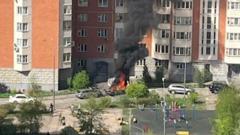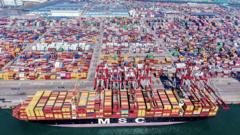In a significant diplomatic move, Russian officials have commenced negotiations in Damascus with new interim leader Ahmed al-Shara, following the toppling of long-time ally Bashar al-Assad by rebel forces. This meeting, the first since the civil war's end, underscores Russia's struggle to maintain military bases in a shifting landscape where they must reconcile with a populace bearing the scars of prior bombardments.
Russia and Syria's New Chapter: Geopolitical Maneuvering After Assad's Fall

Russia and Syria's New Chapter: Geopolitical Maneuvering After Assad's Fall
Russia looks to secure its military presence in post-Assad Syria amidst evolving political dynamics.
The Russian delegation, arriving in a convoy of white SUVs, confronted al-Shara, a survivor of Syria's brutal conflict who is now tasked with rebuilding the nation. The talks, though unresolved, signal the start of a complex bargaining process vital to shaping Russia's role in the new order of Syria. With global powers actively seeking influence, Syria's transitional leadership aims to establish legitimacy and security while navigating a path toward pragmatic relations, even with former adversaries.
The atmosphere in Damascus reflects a desire for de-escalation and a strategic approach to governance amidst ongoing challenges. "We Syrians don’t need a fight with anyone at this point, including our former enemies," remarked Charles Lister from the Middle East Institute, emphasizing the prevailing sentiment of cautious diplomacy in the wake of a decade-long conflict.
The atmosphere in Damascus reflects a desire for de-escalation and a strategic approach to governance amidst ongoing challenges. "We Syrians don’t need a fight with anyone at this point, including our former enemies," remarked Charles Lister from the Middle East Institute, emphasizing the prevailing sentiment of cautious diplomacy in the wake of a decade-long conflict.






















